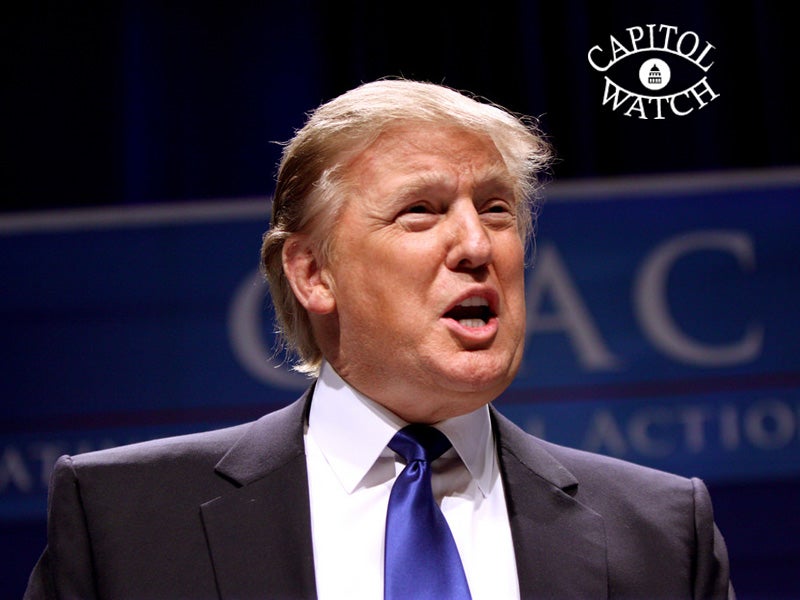5 Ways Trump Talks ‘Clean’ but Budgets Dirty
Trump has most definitely not put his money where his mouth is with this budget. Here are five key ways Trump’s budget would eviscerate crucial environmental programs.

This page was published 8 years ago. Find the latest on Earthjustice’s work.
“My administration is committed to keeping our air and water clean, to preserving our forests, lakes and open spaces, and to protecting endangered species.” —President Trump, Earth Day 2017
…so said President Donald Trump just a few weeks ago. And yet, to the surprise of no one, this week Trump unveiled a 2018 budget proposal that would turbocharge his assaults on bedrock environmental protections, among other assaults on public health and added spending for a mindlessly harmful border wall. While Trump and his crony EPA Administrator, Scott Pruitt, love paying lip service to clean air and water, no rhetoric can paper over the dark reality of this proposed budget.
As evidenced by the below quotes from Trump and his appointees, Trump has most definitely not put his money where his mouth is with this budget. Here are five key ways Trump’s budget would eviscerate crucial environmental programs. Earthjustice will be standing arm-in-arm with our allies in Congress to fight back and make sure these broken promises aren’t written into any final budget agreement.
1. Slashes Funding for Toxic Mess Cleanups
“We want safety and we want environmental protection. I’ve won awards on environmental protection.” —President Trump
Trump’s budget certainly isn’t going to win any “awards on environmental protection.” For starters, it cuts $330 million from Superfund, the program to clean up the most toxic messes left behind by heavy industry, and from the Chemical Safety Board, which investigates industrial chemical accidents. That’s a 30 percent cut compared to the annualized funding level in the 2017 federal spending bill the president just signed on May 5th.
What would that 30 percent cut mean for communities that face serious incidents, such as this major explosion at a fertilizer plant in West Texas? There will be no Chemical Safety Board to investigate potential criminal acts, and no Superfund money to clean up the mess.
2. No Clean Water for the Great Lakes or Chesapeake Bay
“Clean water, crystal clean water is vitally important.” —President Trump
This statement doesn’t hold water. Among other regional programs, Trump’s budget would eliminate funding for the Great Lakes Restoration Initiative and clean-up efforts in the Chesapeake Bay, the Puget Sound, the Gulf of Mexico…the list goes on and on.
Under his budget, cash-strapped states and local governments would have to pick up the more than $400 million tab for clean up and restoration of these iconic water bodies, stalling years of environmental progress. That would be a gut-punch to communities across the country that rely on clean waterways, not only for their health, but also to support the outdoor recreation economy, which generates $646 billion each year and employs more than 6 million Americans.
3. No Environmental Enforcement or Justice
“Clearly, the mission of the EPA… to protect our natural resources, protecting our water quality, improving our air, helping protect the health and welfare of our citizens, is key to the leadership of the EPA, and, where enforcement is necessary, vigorous enforcement.” —Administrator Pruitt
Once again, Trump and Pruitt are not putting their money where their mouths are. How will “vigorous enforcement” of environmental laws happen if funding for enforcement is slashed by more than $122 million (a 28 percent cut compared to the 2017 federal spending bill)? The EPA’s enforcement budget is critical because it is the main mechanism to stop polluters from damaging communities’ air and water.
To add insult to injury, the EPA’s Office of Environmental Justice would be completely eliminated. People of color, low-income communities and Native American tribes are already disproportionately impacted by pollution
“If confirmed, I will faithfully carry out the authorities granted to EPA by Congress to reduce exposure to lead.” —Administrator Pruitt The EPA cannot reduce exposure to lead without money. But Trump’s budget eliminates the EPA’s lead risk reduction program and categorical grants that focus on lead. The ongoing water crisis in Flint, Michigan, has underscored for the nation how dangerous lead is for our children. At a time when children in communities all over the country are at risk of being poisoned by this potent neurotoxin, we need more funding, not draconian cuts. “I think that shows the EPA can be involved and should be involved in … setting objective, science-based standards to improve air quality and protecting the health of our citizens, but also to be a meaningful partner with the states in implementing those laws.” —Administrator Pruitt Despite rhetoric about prioritizing clean air and supporting states and local governments in their own environmental efforts, the Trump budget cuts the EPA’s clean air related programs and grants by $252 million, a 39 percent drop compared to the 2017 federal spending bill. It completely eliminates a program that provides clean-up funding to the state, local and tribal governments with the country’s absolute worst air quality. Tell your representatives in Congress, #HandsOffCleanAir and #HandsOffCleanWater! Clean air and water are not optional budget items; they are required. The 45th U.S. president, Donald J. Trump, is bent on gutting environmental protections, and—with a polluter-friendly Congress at his side—he’ll likely do everything he can to dismantle our fundamental right to a healthy environment. The Capitol Watch blog series will shine a light on these political attacks from Congress and the Trump administration, as well as the work of Earthjustice and our allies to hold them accountable.4. Less Funding, More Toxic Lead
5. Clear-Cut Clean Air Programs
ABOUT THIS SERIES
Established in 1989, Earthjustice's Policy & Legislation team works with champions in Congress to craft legislation that supports and extends our legal gains.